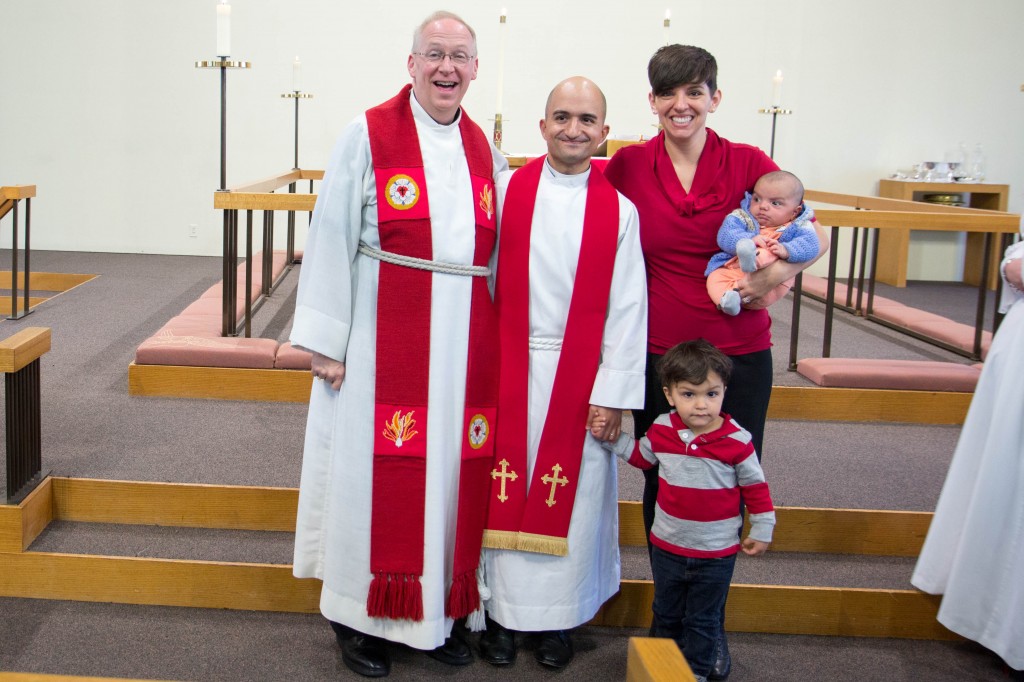The beginning of the good news of Jesus Christ, the Son of God.
As it is written in the prophet Isaiah,
“See, I am sending my messenger ahead of you,
who will prepare your way;
the voice of one crying out in the wilderness:
‘Prepare the way of the Lord,
make his paths straight,’”
John the baptizer appeared in the wilderness, proclaiming a baptism of repentance for the forgiveness of sins. And people from the whole Judean countryside and all the people of Jerusalem were going out to him, and were baptized by him in the river Jordan, confessing their sins. Now John was clothed with camel’s hair, with a leather belt around his waist, and he ate locusts and wild honey. He proclaimed, “The one who is more powerful than I is coming after me; I am not worthy to stoop down and untie the thong of his sandals. I have baptized you with water; but he will baptize you with the Holy Spirit.”
Mark 1:1-8
My sermon from 2nd Sunday of Advent (December 7, 2014) on Mark 1:1-8. Listen to the recording at the bottom of the page or read my manuscript below.
****************************
How would you start Jesus’ story? If someone you know asked you, right now, to tell them about Jesus – exactly how exactly would you start?
Well – the beginning right? Since, like the song says, the beginning is usually a very good place to start. And, right now, we’re kind of in a season about beginnings – this season of Jesus’ start. Even though in the church we’re in this season of Advent – it’s hard not to have Christmas on the brain. Holiday sales, tree decorations, Christmas songs on the radio, wishlists to Santa – that’s the season we’re in. One thing I love to do each day is to see how the houses have changed along the streets I usually take. Each day, another house has a wreath on its door or new outdoor lights. Some houses are covered in giant inflatable ducks and snowmen, others have huge nativity scenes with life size Wisemen and a baby Jesus that looks much bigger than a newborn should. And then there’s the fun stuff – the lawn filled with characters from the Island of Misfit toys, or the one that really makes me and Oliver smile – the house with the lawn with a dinosaur, an Elmo, and Darth Vadar and R2D2 in Santa hats. All of this is a part of this season of beginnings. It points to Christmas. It tries to illustrate Jesus’s birth and entrance into the world. And this, this beginning is a very good place to start.
So when the author of the gospel according to Mark sat down to write – to put the stories of Jesus down on paper – the author faced that same question – where to start? Mark is writing 30 to 40 years after the resurrection. The first generation of disciples, the ones who walked with Jesus or learned from his first disciples, have been dying. The next generation of Christian disciples are taking their place. So Mark is in this period of change – in this period of transition – and he’s surrounded by stories – stories of Jesus’ miracles and resurrection – his betrayal and his life with the poor and unwanted – so Mark takes all that he’s heard, all that he knows, all that the Holy Spirit has given him – Mark takes all of that –
and begins with John.
The gospel begins with a wildman. John is a guy in the wilderness – dressed in camel hairs, eatings bug and honey, and he’s out in the middle of nowhere, preaching, and teaching and baptizing. People are hearing his story, hearing about him, and they’re leaving their homes to find John and to see what this wildman is doing.
And since I grew up in Colorado, it’s hard for me not to fill in the rest of whatJohn the Baptist looks like. To me, he’s like an old fashion mountain man. He’s big and strong, grizzled, with a thick full beard, and he spends his time chopping trees for firewood, wrestling bears, and only coming to town once a year. That’s the wildman character that I grew up with – and you probably have your own. And that image is important because Mark wants us to realize that we’re dealing with just that kind of wildman. He’s living away from the cities – he’s living in the untamed areas of the world where no political or social powers dominate. He’s living off grid before living off grid was cool where the land is untamed, where nature rules, and everything is just raw – uncivilized – but not uncontrolled. There might not be any cities or roads or fences – but Mark’s community knew that the wilderness – the untamed places – that was where God made God’s-self known.
Mark’s community knew their scripture. They knew their bible, what we call the Old Testament. They knew that when Moses met God, Moses was in the wilderness. They knew that Mt. Sinai, when God gave Moses ten commandments to share with the Israelites – to share with them what it means to live a life freed from Egyptian tyranny and slavery – they were in the wilderness. It’s in the wilderness where God sheltered David from Saul, where the prophets of old would retreat when the powers of the world did not want to hear what God wanted to say, and it’s in the wilderness where individual and communal sins were cast out away from the community during Yom Kippur. Only in the raw places could our false sense of self-control, of goodness, of being right and strong and awesome, be taken down – only in the untamed places could our failures and mistakes, our pride and our unknown participation in systems that harmed others be laid bare. Only in the wilderness could we see our sins as they truly are – and be met by the One who promises to not leave us where we are.
And it’s there where Jesus is going to appear.
In the wild – in the mess – in the unexpected places with unexpected people – that’s the stage that Mark is setting for the arrival of Jesus. Away from the cities, away from the political authorities, away from the temples – that’s where God is going to something brand new; that’s where God is going to break through. It’s there – in this untamed land – that John makes the bold assertion that something more is going to happen – that the One who will change the world is on his way.
That immediacy is important for Mark. There’s no build up, no years to wait before Jesus’ ministry begins. The Son of God is happening now. There’s no wait for the time to be right, no time for us to be prepared, no opportunity for the world to decide when to let God in. No, the Son of God is happening now. And it’s in the wilderness – in the messiness – in the untamed areas that Jesus comes first. It’s in the places that cause fear, that cause worry, hat’s where change will come – not in the proper places, or at proper time, but in the way that God promises – to be known, felt, and experienced in the wilderness – in our wilderness – in the untamed places that cause us worry, that causes us pain, that causes us to fear – that’s where God comes. That’s where Jesus will make his presence first known. We’re invited to come out, to go see a wildman, confess our sins, and seek a word of comfort and peace and love from God. For Mark – the start of Jesus’ story begins with the wilderness. It begins with that messiness. It begins with everything that wilderness means to us.
We carry within us our own wildernesses. We’re filled with moments, with experiences, with feelings that have left us spending parts of our lives lost, without connection, with feelings of burnout, fear, loneliness, failure, brokenness – these are moments of wilderness and these can carve themselves into us. They become part of who we are. They help form us, and lead us – and we carry them with us into everyday of our lives.
So returning to that first question I asked in the beginning of the sermon – how would you start Jesus’ story? What if we took a cue from Mark and we started first with talking about our own wilderness?
To start Jesus’ story with wilderness would mean that we would have to do a difficult thing – and that’s be honest with our own story, honest with all parts of our story and what the wilderness in our lives look like. We would need to be honest with the wildernesses that we find ourselves in – from ones that we’ve imposed on ourselves to those that have been imposed on us through no fault of our own. We’d have to be honest with the wildernesses we carry as folks who live here in Northern New Jersey, and in the United States – honest with our own history, our culture, and what our society has said about others, said about ourselves, and be honest about the wildernesses we’ve created for others who didn’t fit our norm.
To start Jesus’ story with the wilderness means to take the chance and the risk to tell our honest story, to tell our fears, our worries, our failures and sins. To start in the wilderness means to go into the wilderness – to go into the untamed places – to go into the uncomfortable places – and to ask for understanding, forgiveness, mercy, and love.
I believe that Mark started in the wilderness because he knew what happens in the wilderness. He knew that in the uncomfortable places, God comes. He knew that in the untamed experiences, Jesus comes. He knew that in the hurt and fear and despair, the Holy Spirit is there. Our wildernesses are never so big, never so deep, never so distant, that God will not go there. Our wildernesses are never so vast that they’ll keep Jesus from us. Because it’s in those untamed places that God comes. It’s in the untidy places that God makes Godself known. It’s in the places where we don’t want God to go that Jesus breaks in and doesn’t leave us alone.
In these first verses from Mark – we’re given an invitation to live into Jesus beginning by starting a new beginning ourselves. Because the story of Jesus is more than just a birth story, more than just a series of events that happened 2000 years ago in a country far from here. The story of Jesus is a story of encounter, it’s a story of meeting, it’s a story of presence in our lives. Any story about Jesus needs to start in the wilderness – in our wilderness – and needs to never only be a story that sounds like “Jesus did this, Jesus said this, Jesus taught this…” but should sound like “Jesus did this for me, Jesus said this to me, Jesus taught this to me and this is how I have struggled, this is how I have felt fear, this is how I’ve doubted, and this is how I’ve been changed.”
In this season of beginnings – of starts – of giant nativity sets and Darth Vadar in Santa hats – lets take this invitation from Mark to heart and enter into our wilderness, enter into our untamed places, enter into our fears – and lets discover just how God meets us there.
Amen.
Podcast: Play in new window | Download



